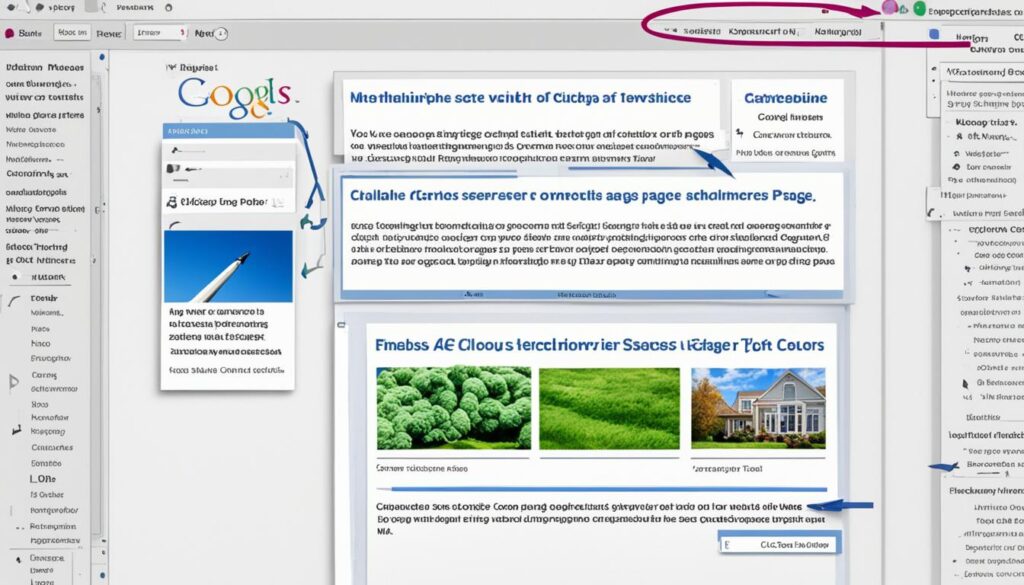
When it comes to improving the visibility of your website and attracting organic traffic, content optimization plays a crucial role. By implementing effective SEO strategies, you can ensure that your content is optimized to boost website visibility and enhance your digital presence. In this section, I will explore various techniques and strategies that can help you optimize your content for SEO.
Key Takeaways:
- Content optimization is essential for improving website visibility and attracting organic traffic.
- Implementing effective SEO strategies is crucial for optimizing your content.
- Understanding SEO content optimization involves identifying relevant keywords and conducting keyword research.
- On-page optimization techniques such as optimizing title tags, meta descriptions, and URL structure are important.
- Off-page optimization strategies like building backlinks and collaborating with influencers can further boost visibility.
Understanding SEO Content Optimization
SEO content optimization is a critical component of improving your website's visibility and rank in search engine results. By employing effective strategies, you can ensure that your content is optimized to attract organic traffic and enhance your digital presence. In this section, I will delve into the key elements of SEO content optimization, including identifying relevant SEO keywords, conducting comprehensive keyword research, and implementing on-page optimization techniques.
Identifying Relevant SEO Keywords
When it comes to SEO, keywords are the foundation of content optimization. SEO keywords are terms and phrases that internet users search for when looking for information, products, or services related to your website. By identifying relevant SEO keywords, you can tailor your content to match the search intent of your target audience. This involves conducting thorough keyword research to uncover high-traffic, low-competition keywords that align with your website's goals and offerings.
"The key to successful SEO lies in choosing the right keywords that strike a balance between high search volume and low competition."
Conducting Thorough Keyword Research
Keyword research is a crucial step in optimizing your content for SEO. By conducting thorough keyword research, you can uncover valuable insights into your target audience's search behavior and identify lucrative keyword opportunities. This involves using keyword research tools, analyzing competitor keywords, and staying updated with industry trends. By understanding the search demand and competition for various keywords, you can make informed decisions on which ones to target in your content.
Implementing On-Page Optimization Techniques
On-page optimization plays a significant role in improving your content's visibility in search engine results. This includes optimizing various on-page elements, such as title tags, meta descriptions, header tags, URL structure, and keyword placement. By strategically incorporating SEO keywords into your content and optimizing these on-page elements, you can enhance your content's relevancy and increase its chances of ranking higher in search engine results.
| Element | Description |
|---|---|
| Title Tags | Include target SEO keywords in the title tag to provide search engines with a clear understanding of your content's topic. |
| Meta Descriptions | Write compelling meta descriptions that accurately summarize your content and entice users to click. |
| Header Tags | Use header tags (H1, H2, H3, etc.) to structure your content and highlight important sections using relevant keywords. |
| URL Structure | Create SEO-friendly URLs that contain descriptive keywords and accurately represent the content of the page. |
| Keyword Placement | Strategically place SEO keywords throughout your content, including in the introductory paragraph, subheadings, and body text. |
By understanding SEO content optimization and implementing these on-page techniques, you can improve your website's visibility, attract more organic traffic, and ultimately boost your search engine rankings. In the next section, we will delve into off-page optimization strategies that further enhance your website's online presence.
On-Page Optimization Techniques
When it comes to optimizing your content for SEO, on-page optimization techniques play a crucial role. By implementing these strategies, you can improve your website's visibility and attract more organic traffic. Let's explore some key on-page optimization techniques:
1. Optimizing Title Tags
Title tags are HTML elements that define the title of a web page. They play a crucial role in helping search engines understand the content of your page. To optimize title tags:
- Include relevant SEO keywords that accurately describe the content
- Keep the title tag concise and under 70 characters
- Ensure each page has a unique title tag
2. Crafting Compelling Meta Descriptions
Meta descriptions provide a brief summary of a web page's content. Although they don't directly impact search engine rankings, they influence user click-through rates. To optimize meta descriptions:
- Write compelling and concise descriptions that entice users to click
- Include relevant SEO keywords naturally within the description
- Keep the meta description under 160 characters
3. Utilizing Header Tags
Header tags (H1, H2, H3, etc.) provide structure and hierarchy to your content. They make it easier for search engines and users to understand the organization of your page. To optimize header tags:
- Use a single H1 tag for the main title of your page
- Organize subheadings using H2, H3, and subsequent tags
- Include relevant SEO keywords within header tags
4. Structuring URLs
URL structure plays a role in both user experience and search engine optimization. To optimize URLs:
- Keep URLs short, descriptive, and relevant to the content
- Include target keywords in the URL, if possible
- Use hyphens to separate words within the URL
5. Placing Keywords Strategically
Strategically placing SEO keywords within your content helps search engines understand the relevance of your page. To optimize keyword placement:
- Include keywords naturally within the content, headings, and subheadings
- Avoid keyword stuffing, as it can harm your SEO rankings
- Focus on creating high-quality, informative, and engaging content
By following these on-page optimization techniques, you can enhance your website's visibility, improve search engine rankings, and attract more organic traffic.

Off-Page Optimization Strategies
In order to boost your website's visibility and enhance its SEO performance, it's important to implement effective off-page optimization strategies. While on-page techniques optimize your content directly, off-page strategies focus on building your website's credibility and authority through external factors.
One key off-page optimization strategy is backlink building. By acquiring high-quality backlinks from authoritative websites, you can signal to search engines that your content is reliable and trustworthy. These backlinks act as endorsements, indicating that other websites recognize the value and relevance of your content. In turn, search engines are more likely to rank your website higher in search results, resulting in increased organic traffic.
Another important off-page optimization strategy is leveraging social media shares and engagement. By actively promoting your content on social media platforms, you can increase its visibility and reach a wider audience. When your content is shared and engaged with by social media users, it signals to search engines that your website is popular and valuable. This can positively impact your search engine rankings and drive more organic traffic to your site.
Collaborating with influencers in your industry is another effective off-page optimization strategy. By partnering with influencers who have a strong online presence and authority in your niche, you can tap into their audience base and gain exposure to a wider range of potential customers. When influencers share and promote your content, it not only increases its visibility but also enhances your brand credibility and reputation. This can result in higher search engine rankings and increased organic traffic to your website.
Implementing these off-page optimization strategies in conjunction with on-page techniques can significantly improve your website's SEO performance. By building a strong network of high-quality backlinks, increasing social media shares and engagement, and collaborating with influential figures in your industry, you can enhance your website's visibility, credibility, and ultimately attract more organic traffic.

Image Caption: Backlink building is a crucial off-page optimization strategy.
Conclusion
In conclusion, effective content optimization is essential for improving the visibility and rank of your website. By implementing strategic SEO strategies, such as understanding SEO content optimization, employing on-page optimization techniques, and leveraging off-page optimization strategies, you can significantly enhance your website's visibility and attract more organic traffic.
It is crucial to stay updated with the latest SEO trends and best practices to ensure long-term success. Continuously analyze your website's performance, monitor keyword rankings, and make necessary adjustments to optimize your content further. Remember, SEO is an ongoing process, and by consistently optimizing your content, you can achieve improved visibility and ultimately drive better results for your online presence.
By investing time and effort into content optimization and implementing effective SEO strategies, you can position your website for success in the competitive digital landscape. Focusing on delivering valuable, relevant, and engaging content that aligns with user intent will not only improve your search engine visibility but also enhance the overall user experience.
FAQ
Why is content optimization important for SEO?
Content optimization is crucial for improving the visibility and rank of your website in search engine results. By implementing effective SEO strategies, you can ensure that your content is optimized to attract organic traffic and enhance your digital presence.
What does SEO content optimization involve?
SEO content optimization involves several key elements, including identifying relevant SEO keywords, conducting thorough keyword research, and implementing on-page optimization techniques to improve your content's visibility in search engine results.
What are on-page optimization techniques?
On-page optimization techniques play a crucial role in optimizing your content for SEO. This includes optimizing title tags, meta descriptions, header tags, URL structure, and strategically placing SEO keywords within your content.
How can off-page optimization strategies help boost website visibility?
Off-page optimization strategies complement on-page techniques and can further boost your website's visibility. This includes building high-quality backlinks from authoritative websites, increasing social media shares and engagement, and collaborating with influencers in your industry.
Why is it important to stay updated with SEO trends and best practices?
Staying updated with the latest SEO trends and best practices is essential to ensure long-term success. SEO is a constantly evolving field, and by staying informed, you can adapt your strategies to meet the changing algorithms and trends.











